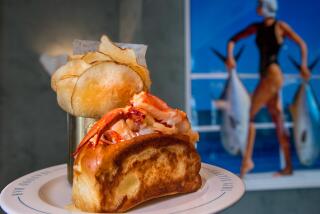Lobstermen Have to Be Cagey
- Share via
It is the second day of lobster season, and Andy Volaski, 66, is back on the water at 6 a.m. for a long day on a rolling boat out of Channel Islands Harbor. He is searching for the prey that will support him and his wife through the next six months.
He has 130 traps, a little more than he needs, because he is prepared to lose some to thieves. He set them--tossing the heavy cages along the shoreline near Malibu--on Tuesday, the day before lobster season officially started.
Now, on Thursday, he gets to see the results of his work, and find out again if it all paid off. His crew is Kevin Reynolds, a longtime fisherman and fixture on the docks at Channel Islands Harbor, and Bob House, a friend and retired electrician with a permanent tan, a lobster tattoo on his arm and a willingness to work for free.
The season for California spiny lobsters--also known as rock lobsters--runs from October through March. Volaski is one of as many as 300 commercial fishermen along the coast of California who are permitted to trap. In Ventura County, about a dozen make their living off lobsters.
The crustaceans are highly prized. Spiny and bumpy, they bring in about $9 each--a bounty so big that Reynolds calls them “the cocaine of the sea.”
These men have spent their lives on the water. Four of Volaski’s five children are fishermen, too. They are tough, with arms scratched up from knives and the sharp edges of traps. They taunt each other, but not without some friendliness. Reynolds gets the brunt of it today as he fights an upset stomach.
It’s hard, ceaseless, repetitive work on the Arlene M., a 32-footer named for Volaski’s wife. First, the men find the purple buoy that marks Volaski’s cages. They hoist the trap using a pulley contraption. Then, they hack away with machetes at the veil of kelp that clings to the trap.
They do it all over and over again, 130 times.
Often, they get nothing but hordes of spider crabs that are flung back into the ocean. Sometimes, they get one or two lobsters. The most they pull up on a single trap today is nine lobsters, but several have to be tossed back because they don’t reach the legal size requirement.
The lobsters scratch and flail, beating their tails against themselves with an unhappy clack when they are wrested from the cage.
There is nothing glamorous about this day at sea. The men use disintegrating chunks of mackerel for bait. The traps are hefty and unwieldy, weighing 30 to 50 pounds each when empty. Poachers sometimes steal their catch.
The day is long and, by the end of it, the catch fits into a single tub, a writhing mass of lobsters, dumped into a heap. They grab on to their brethren with a surprisingly strong grip, hooked like 3-D puzzle pieces.
Up close, each one looks otherworldly. Unlike the classic Maine variety, these don’t have claws and smooth surfaces. They are bumpy and crimson-brown, with bright orange strips along their fuzzy, spider-like legs. Their eyes are an eerie black--buggy, bisected bubbles on the sides of their heads.
It has not been a particularly good day, but the men take it philosophically.
“It’s so hard. You might make a thousand dollars today--another day you might make nothing,” Volaski said. “When things don’t go right, we blame it on the moon.”
In eight hours that feel like 12, they have caught about 190 pounds of lobster, not much for their first day out. When they get back to the dock, they will call a restaurant that buys from them regularly. Some people will be waiting to buy fresh off the dock. On the way back, they pass a sportfishing boat. House holds up a wriggling lobster so the tourists can see what they have.
But there are no guarantees they will be able to sell the whole catch.
Volaski says at one point early in the trip, “If I was a kid, I would never get into this.” There are too many requirements now, too many people competing in too little space, too much technology that allows newcomers to compete with people who have spent their lives at the trade.
But later, he says if he had his life to do over again he wouldn’t do anything different.
“It’s like being a gambler,” he said. “You hardly ever remember the bad times. You remember the good times.”
More to Read
Sign up for Essential California
The most important California stories and recommendations in your inbox every morning.
You may occasionally receive promotional content from the Los Angeles Times.













